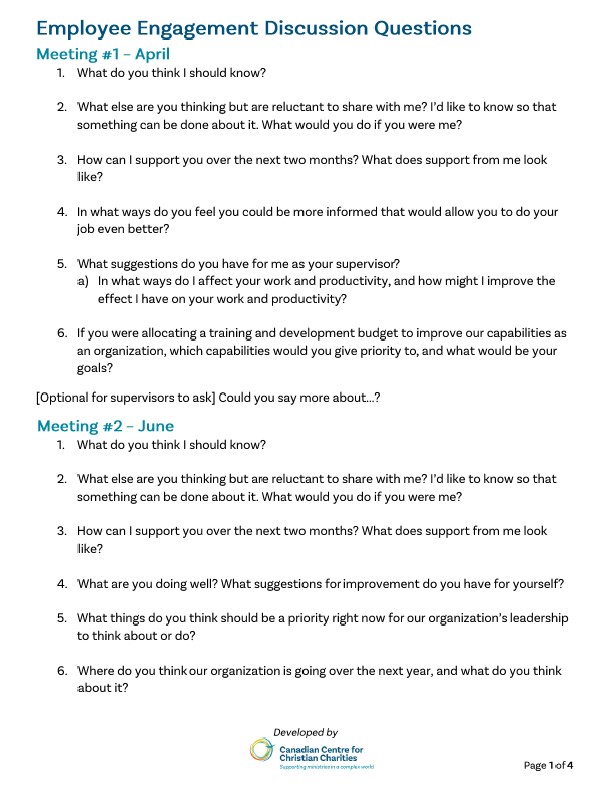As a leader, I’m sure you want a fabulous and stimulating workplace environment in which staff thrive and grow and freely contribute their gifts to support your mission. I want that too!
As part of realizing that goal, CCCC created employee engagement discussions so staff could discuss their well-being and development with their supervisor.1 Our staff and their immediate supervisors have had great success in building open and honest conversations with each other. We believe their strong relationships are the basis for a healthy workplace environment, as evidenced in our Best Christian Workplaces survey results. In this post I will share the process we use and provide a list of the discussion questions. CCCC members can go to The Green to discuss this post and download the CCCC Employee Engagement Policy—which includes the detailed process—and all its related forms. The comments section below is open for all readers.
Towards Authenticity in the Workplace
When it comes to having conversations with staff members, the big question to address is: will employees honestly share what they really think? Don’t employees need the protection of anonymity to be honest? I’ve previously addressed this issue and given suggestions for how to increase authenticity and trust in the workplace. This post builds on the foundation of that post.
CCCC believes Christians should be able to share their honest thoughts with one another. We should not be afraid of retribution from those in authority over us. Some might say this is an unrealistic, idealistic fantasy! But why should we settle for less than God’s way in how we work together in Christian ministry? Aren’t we supposed to model for the world what kind of a society God wants us to have? Aren’t our workplaces like smaller versions of society? Shouldn’t we, of all people, be able to demonstrate a workplace in which every person is honoured and respected?
As the leader, it is your responsibility to set the tone for honest conversations. You might model disclosure by being transparent (as appropriate) about what you are thinking. And if a staff member does take a risk and open a dialogue with you, you must make it a good experience for the staff member. Thank them for taking the risk and raising the matter. All the supervisors in your organization should likewise be trained to be open to any and all feedback from their direct reports. We can only expect staff to honestly share if they are certain that their thoughts will be well and warmly received. This environment of trust will form during the back-and-forth process of open and honest discussion over time.
The Christian way of living in community is the way of authenticity, transparency, and vulnerability, choosing to be real with one another and learning to live and work together, seeking to understand and be Christ to one another.
Listening to Staff

So here’s one key thing we do at CCCC to facilitate open and honest dialogue with our staff. We schedule six employee engagement discussions per year for each staff member to have a one-on-one meeting with his or her supervisor.
Rules for Discussions
These meetings follow a few simple rules:
- The meeting is about the staff member, not the supervisor. So, there is no discussion about the employee’s work, no assignments are handed out, and no performance feedback is given. Staff is encouraged to share whatever is on their mind.
- The role of the supervisor is to ask a series of open-ended questions that have been provided to the employee before the meeting and then listen to the answer. The supervisor may ask follow-up questions for clarity or to dive deeper into what the employee has said. The supervisor may also answer any questions that are raised or provide explanations, but the meeting is about listening, not debating.
- Both the supervisor and the staff member can make commitments based on their conversation.
- All commitments are documented so both the employee and the supervisor are accountable for acting on their commitments.
Protection for Staff
To protect staff from our own failings as Christian leaders, CCCC has a Grievance Policy and a Whistleblower Policy. But before anyone has to take one of those two drastic steps, we’ve made it clear that no staff member will suffer retaliation for being honest in their relationship with their manager.
The Discussion Questions
Each of the six meetings is centred on three questions. These questions are asked only once per year, so over the year we ask eighteen questions. Each question came from researching employee engagement. Some were provided by researchers and some were developed by us based on research. At each meeting, one question relates to the employee, one to their supervisor, and the third to the organization as a whole.
In addition to the three questions that change with each meeting, there are three standard questions that are asked at every meeting:
- What do you think I should know?
- What else you are thinking but are reluctant to tell me? Please share it.
- What can I do to support you over the next two months?
Here are all the questions arranged in a single list:

The Process
- The meetings are scheduled for every other month starting with April (the first month of our fiscal year).
- The cycle for each meeting starts by asking all supervisors if there is an additional question they’d like to include in the discussion. This allows for the possibility that there might be a particular concern about staff morale at any given time.
- The meetings are set up and the questions are sent to the staff. Their written responses are sent directly to their supervisors before the meeting.
- The first item on the meeting agenda is to review the commitments for action that were made at the previous meeting. The results are discussed and, if everyone is satisfied with the results, the commitment is closed. If it is still unresolved, it is added as a new action item and tracked again. Either party may escalate the matter to the supervisor’s manager.
- The employee’s answers to this meeting’s questions are then discussed and new commitments are made.
- The employee receives a copy of the action form, and the employee’s answers and the commitment form are sent to the Head of Human Resources, who will review them and prepare a report to leadership if there are any trends.
- A seventh meeting is held in the month after the sixth and final employee engagement discussion of the year. These are conducted either by skip-a-level supervisors or the Head of Human Resources. The purpose of this meeting is to independently check with staff that they are satisfied their concerns and ideas have been heard and dealt with fairly.
The Benefits
Because of these meetings:
- New ideas are brought forward for consideration.
- Improvements to systems and workflows are made.
- Misunderstandings and misconceptions are cleared up.
- We get to know each other better and mutual trust is enhanced.
- Staff have a bigger picture of the ministry and how it works.
- We are all more engaged with the ministry.
May God bless you and your staff as you enjoy richer and more meaningful conversations!
- Many thanks to Barry Slauenwhite, president of Compassion Canada at the time, who gave us the idea. ↩


